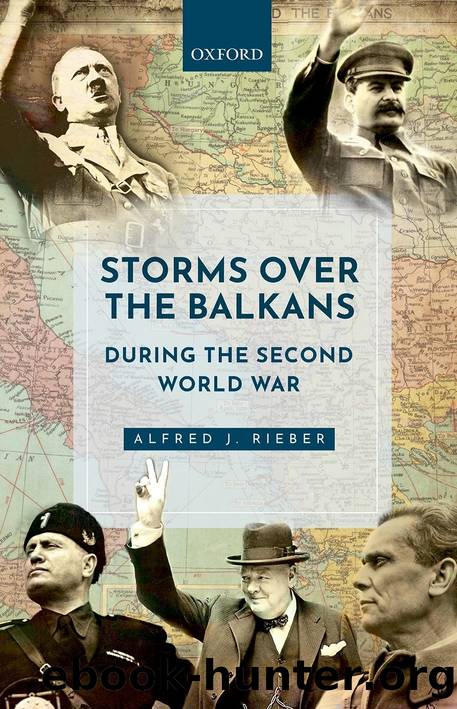Storms over the Balkans During the Second World War by Alfred J. Rieber

Author:Alfred J. Rieber [Rieber, Alfred J.]
Language: eng
Format: epub
Publisher: Oxford University Press
Published: 2022-02-26T00:00:00+00:00
The Greek Connection
Greece loomed large in Churchillâs Mediterranean strategy in line with traditional British policy.44 His interventionist tactics were more aggressive and eventually more brutal than in the rest of the Balkans. He was faced with an internal situation that was just as complex as that in Yugoslavia, but at least he did not have to compete directly with Stalin as part of the mix. Moreover, his advisers were divided over several key issues, similar to the situation in Yugoslavia but with additional complexities. Their main differences centered on the nature and even the value of the resistance and the future constitutional structure of the state.
The resistance movement in Greece got off to a slow start. From the moment of the Greek surrender and British evacuation, the old divisions within Greek society and the political elite between the monarchists and the republicans began to surface once again, and Greek politics reverted to the pattern of patronâclient relations.45 The breakdown of the Greek resistance movement was rooted in deep prewar social fissures. The ordeal of the First World War had split the country into two hostile camps, opening up âthe national schismâ that plagued the country throughout the rest of the twentieth century and beyond. One side backed the king and his policy of neutrality in the First World War. The republic opposition was devoted to the charismatic leader of the Liberal Party, Eleutheros Venizelos. Committed to the âMegale Ideaâ of a Greater Greece of âfive seas and two continents,â he was determined to lead the country into the First World War on the Allied side, even though this meant breaking with the king who was pro-German, and plunging the country into a constitutional crisis. His action sparked a virtual civil war between the royalist âState of Athensâ and his own rebellious, provisional government, the âState of Thessaloniki.â Venezelosâ attempt to bring the Greek speaking population of Western Anatolia into a Greater Greece led to a disastrous war with the new Turkish Republic.46
Defeat, a massive flight of Greeks from Asia Minor and a population exchange with Turkey swelled the population of Northern Thrace by over 600,000 immigrants. Their influx diluted the ethnic composition of Thrace and Macedonia, reducing the Slavonic speakers to a small minority. Initially hostile to the left, they later became the bulwark of the communist resistance in the region. When the Greek Communist Party reorganized itself in 1930 about half the central committee and almost all the members of the politbureau including the secretary general, Nikos Zachriades, came from the immigrant population of the north.
During the republican era, the communist party emerged as a real political force, picking up strength from the Venezelists as the depression cut into their constituency of workers and poor peasants. It skillfully exploited the appeals of the Popular Front, re-knitting the divided trade union movement. But it barely survived a military coup in 1936 and the establishment of a dictatorship under General Metaxas. The German invasion probably saved the Communists from extinction as it did elsewhere in the Balkans.
Download
This site does not store any files on its server. We only index and link to content provided by other sites. Please contact the content providers to delete copyright contents if any and email us, we'll remove relevant links or contents immediately.
The Radium Girls by Kate Moore(12003)
100 Deadly Skills by Clint Emerson(4900)
Rise and Kill First by Ronen Bergman(4761)
The Templars by Dan Jones(4672)
The Doomsday Machine by Daniel Ellsberg(4474)
The Rape of Nanking by Iris Chang(4189)
Killing England by Bill O'Reilly(3987)
Stalin by Stephen Kotkin(3940)
Hitler in Los Angeles by Steven J. Ross(3935)
12 Strong by Doug Stanton(3539)
Hitler's Monsters by Eric Kurlander(3320)
Blood and Sand by Alex Von Tunzelmann(3181)
The Code Book by Simon Singh(3162)
Darkest Hour by Anthony McCarten(3112)
The Art of War Visualized by Jessica Hagy(2988)
Hitler's Flying Saucers: A Guide to German Flying Discs of the Second World War by Stevens Henry(2742)
Babylon's Ark by Lawrence Anthony(2659)
The Second World Wars by Victor Davis Hanson(2512)
Tobruk by Peter Fitzsimons(2494)
